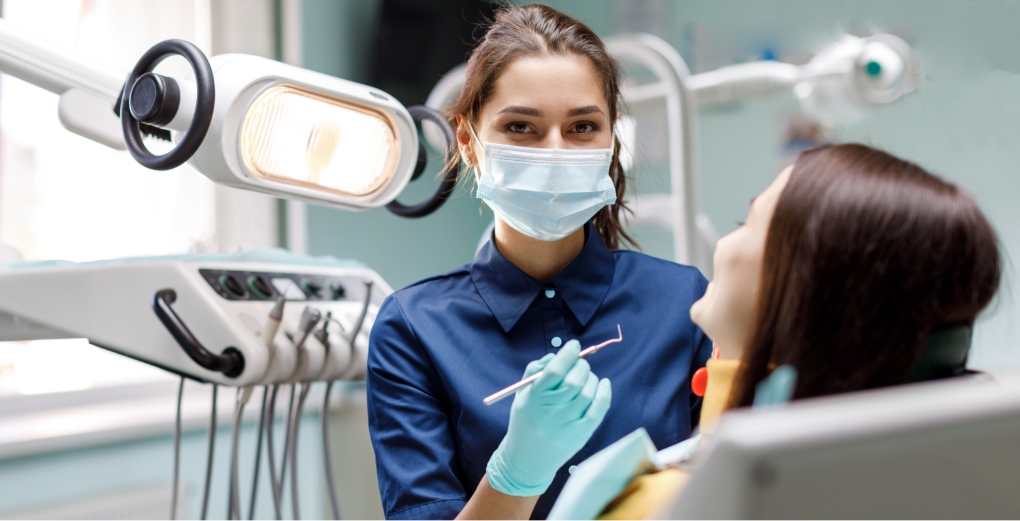Teeth Cleaning
Teeth cleaning services, also known as dental cleanings or dental hygiene appointments, are professional dental procedures aimed at maintaining and improving oral health. These services involve the removal of plaque, tartar (hardened plaque), and stains from the teeth’s surfaces. Dental cleanings play a crucial role in preventing gum diseases, cavities, and other oral health issues.
Who Can Provide Teeth Checkup Services:
Teeth checkup services are typically provided by licensed dental professionals, including:
- Dentists: Dentists are highly trained medical professionals who diagnose, treat, and prevent oral health issues. They can perform comprehensive dental examinations, including teeth cleanings and other dental treatments.
- Dental Hygienists: Dental hygienists are specifically trained to perform teeth cleanings and provide preventive dental care. They work under the supervision of dentists and are responsible for removing plaque, tartar, and stains from the teeth.
When Should You Consider Dental Cleanings:
Regular dental cleanings are recommended for individuals of all ages as part of a proactive oral hygiene routine. You should consider dental cleanings:
- Every Six Months: It’s generally recommended to have a dental cleaning every six months. Regular cleanings help prevent the buildup of plaque and tartar, which can lead to more serious oral health issues if left untreated.
- As Advised by Your Dentist: Depending on your oral health condition, your dentist or dental hygienist may recommend more frequent cleanings. Individuals with a history of gum disease or other dental problems might need more frequent visits.
What Happens During a Dental Cleaning:
During a dental cleaning appointment, the following steps typically take place:
- Physical Examination: The dental professional will examine your mouth for any visible issues, such as cavities, gum inflammation, or signs of oral cancer.
- Plaque and Tartar Removal: Using specialized tools, the dental hygienist will carefully remove plaque and tartar buildup from the surfaces of your teeth. This step is crucial to prevent gum disease and cavities.
- Teeth Polishing: After the removal of plaque and tartar, the dental professional will use a gritty paste and a rotating brush to polish your teeth. This helps remove surface stains and leaves your teeth feeling smooth.
- Flossing: The dental hygienist will floss between your teeth to clean areas that your toothbrush might miss.
- Fluoride Treatment: In some cases, a fluoride treatment may be applied to strengthen your teeth and help prevent cavities.
- Educational Guidance: The dental professional might provide you with guidance on proper oral hygiene techniques, such as brushing and flossing, tailored to your individual needs.
How to Pick the Right Toothbrush and Toothpaste:
Selecting the right toothbrush and toothpaste is essential for maintaining good oral hygiene. Here are some tips to help you make the right choices:
Toothbrush:
- Bristle Type: Opt for a toothbrush with soft or extra-soft bristles. Hard bristles can damage your gums and tooth enamel.
- Size: Choose a toothbrush head that comfortably fits in your mouth and can easily reach all surfaces of your teeth.
- Handle: Pick a toothbrush with a comfortable and easy-to-grip handle for better control during brushing.
- Electric vs. Manual: Both electric and manual toothbrushes can be effective. Electric brushes might offer added convenience and better plaque removal for some individuals.
Toothpaste:
- Fluoride Content: Look for toothpaste that contains fluoride, as it helps strengthen enamel and prevent cavities.
- Specific Needs: If you have sensitivity, gum issues, or whitening preferences, choose a toothpaste tailored to your needs.
- ADA Seal: Opt for toothpaste with the American Dental Association (ADA) seal of approval, ensuring it meets safety and efficacy standards.
Importance of Maintaining Your Smile’s Health:
Maintaining your smile’s health goes beyond just aesthetics; it plays a vital role in overall well-being.
- Oral Health Impact: Poor oral health can lead to cavities, gum disease, bad breath, and tooth loss, affecting your ability to eat and speak comfortably.
- Systemic Health Connection: Research suggests a link between oral health and systemic health conditions like diabetes, heart disease, and respiratory issues.
- Confidence and Self-esteem: A healthy smile boosts self-confidence and enhances your overall appearance, positively influencing social interactions.
More Benefits for Regular Cleanings and Exams:
Regular dental cleanings and exams offer numerous advantages:
- Preventive Care: Cleanings remove plaque and tartar buildup, preventing gum disease and cavities.
- Early Detection: Regular exams enable early detection of dental issues, minimizing the need for invasive treatments.
- Professional Guidance: Dental professionals provide personalized oral care tips and address concerns during checkups.
- Oral Cancer Screening: Routine exams include oral cancer screenings, improving the chances of early detection and treatment.
- Save Costs and Pain: Addressing dental problems early prevents more extensive treatments, saving you money and discomfort.
What to Expect During a Teeth Cleaning:
A teeth cleaning, also known as a dental hygiene appointment, is a straightforward and important procedure that promotes optimal oral health. Here’s what you can expect during a typical teeth cleaning session:
- Warm Welcome: When you arrive at the dental office, the receptionist will greet you and assist with any necessary paperwork or insurance information.
- Preparation: You will be escorted to the dental hygiene area, where a dental hygienist will prepare for the cleaning. They might take X-rays if necessary to assess your teeth and identify any underlying issues.
- Physical Examination: Before beginning the cleaning, the dental hygienist will visually examine your mouth, gums, and teeth. They will look for any signs of inflammation, cavities, or other oral health concerns.
- Plaque and Tartar Removal: Using specialized tools, the hygienist will carefully remove plaque and tartar buildup from the surfaces of your teeth. This process might involve scraping and scaling, which are essential for preventing gum disease and tooth decay.
- Thorough Cleaning: After plaque and tartar removal, the hygienist will use a gritty toothpaste and a rotating brush to clean and polish your teeth. This step removes surface stains, leaving your teeth feeling smooth and refreshed.
- Flossing: The hygienist will floss between your teeth to clean areas that your toothbrush might not reach effectively. This step ensures a thorough cleaning of all surfaces.
- Fluoride Treatment: In some cases, a fluoride treatment may be applied. Fluoride helps strengthen your tooth enamel and offers added protection against cavities.
- Education and Tips: The dental hygienist will provide you with personalized advice on proper brushing and flossing techniques, as well as suggestions for maintaining good oral hygiene at home.
- Discussion and Next Steps: If any oral health issues are identified during the cleaning, the hygienist might discuss them with you and recommend further actions, such as follow-up appointments or treatments.
- Booking Future Appointments: Before you leave, you can schedule your next teeth cleaning appointment to ensure you maintain regular dental care.
Book a Teeth Cleaning with Dntl Bar Today:
Looking to prioritize your oral health? Book a teeth cleaning today to experience professional dental care and maintain a healthy smile. Our experienced dental hygienists are dedicated to providing thorough cleanings, personalized advice, and a comfortable experience.
Conclusion:
In conclusion, prioritizing your oral health through regular teeth cleanings is a crucial step toward maintaining a healthy and confident smile. These dental hygiene appointments offer numerous benefits, including the removal of plaque and tartar buildup, prevention of gum disease and cavities, and early detection of potential dental issues. A well-maintained smile contributes not only to your oral health but also to your overall well-being.
Find a location


